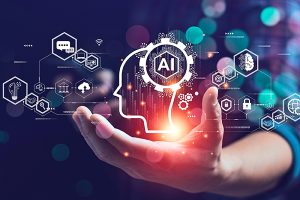Artificial intelligence (AI) is no longer a concept of the distant future—it has already transformed industries across the globe. Specifically, AI in finance has emerged as one of the most groundbreaking developments, changing the way decisions are made, operations are managed, and customer needs are met. But what does AI finance look like as we move towards 2025?
This blog explores the evolving landscape of AI in finance, focusing on its current state, future trends like predictive analysis, and its impact on personal and business finance. We’ll also discuss ethical considerations and the future of work in a financial sector increasingly driven by AI.
Understanding AI in Finance and Its Evolution

At its core, AI in finance refers to the use of artificial intelligence technologies—machine learning, natural language processing, and predictive analytics—to enhance and automate financial services. From algorithmic trading to chatbots solving customer queries, AI applications have become integral to finance.
The early 2020s served as the foundation for AI adoption in finance. This period saw AI being used primarily for fraud detection, personalized customer experiences, and robo-advisors. By 2025, AI in finance will not only improve operations but also redefine how businesses and individuals make financial decisions.
The Current Landscape of AI in Finance
Today, AI is firmly embedded in the financial industry. Some key technologies and applications include:
- Machine Learning Algorithms for fraud detection, credit scoring, and portfolio management.
- Natural Language Processing (NLP) powering chatbots and customer service tools that can interact with users in real-time.
- Robotic Process Automation (RPA) simplifying repetitive tasks such as data entry and reconciliation.
- AI-driven Robo-Advisors offering customized investment advice at a fraction of traditional advisory costs.
Leading firms such as JPMorgan Chase, PayPal, and Goldman Sachs are leveraging these technologies to stay ahead, while FinTech startups continue to innovate with disruptive AI-driven finance solutions. These foundational uses set the stage for what’s to come in 2025.
AI in Finance Predictions for 2025
Predictive Analysis Capabilities
One of the most significant advancements in AI finance by 2025 will be the enhanced role of predictive analysis, where AI systems not only analyze historical data but forecast future trends with even greater precision. Key developments include:
- Market Forecasting: AI-powered systems will process massive datasets to predict stock market trends, macroeconomic shifts, and currency fluctuations in real-time.
- Tailored Investment Strategies: Advanced predictive tools will use consumer behavior patterns alongside market insights to generate hyper-personalized investment plans.
- Corporate Risk Assessments: Companies will rely on AI’s predictive capabilities not only for operational planning but also for identifying risks, such as potential financial downturns.
Predictive analysis will serve as a powerful tool, enabling businesses to proactively make informed decisions, rather than react to market changes.
AI’s Influence on Personal Finance

AI is set to revolutionize personal finance management in several ways, offering tools that empower individuals to make smarter financial choices. Here are some expected highlights for 2025:
- AI-Powered Personal Finance Apps: Apps like Mint and PocketGuard will advance further with AI-assisted features, offering real-time budgeting updates, personalized saving tips, and alerts for overspending.
- Automated Savings and Investments: By understanding consumer spending habits, AI platforms will enable users to set and achieve financial goals effortlessly, automatically transferring funds into savings or investment accounts.
- Virtual Financial Advisors: Unlike the traditional financial advisors of the past, AI-driven advisors will deliver 24/7 insights tailored to an individual’s financial health, lifestyle, and future aspirations.
The result will be an era of unprecedented financial inclusivity, where even those with limited funding or knowledge can make informed decisions.
Transforming Business Finance with AI
For businesses, the impact of AI in finance will be even more profound, offering a wide range of operational, strategic, and risk-management benefits. Key applications in 2025 include:
- Risk Assessment: AI models will analyze multiple economic and geopolitical variables to assess credit risk or predict potential financial crises, helping businesses mitigate threats.
- Fraud Detection: AI will continue to safeguard companies from fraudulent activities through highly advanced pattern recognition systems, identifying anomalies in real-time.
- Operational Efficiency: Intelligent automation will handle complex financial processes such as invoice management, compliance checks, and tax calculations with minimal human intervention.
- Optimized Supply Chain Finances: By 2025, AI will improve cash flow forecasting and streamline payments across global supply chains, boosting operational resilience.
Through improved efficiency and decision-making capabilities, AI will enable businesses to scale faster and remain competitive in an increasingly data-driven economy.
Regulatory and Ethical Challenges of AI in Finance
While the deployment of AI in finance offers endless opportunities, regulatory and ethical concerns must be addressed to ensure trust and transparency. Challenges include:
- Data Privacy: AI systems process an overwhelming amount of sensitive user data. Ensuring GDPR-compliant handling of such information will remain paramount.
- Algorithmic Bias: Unintentional biases in AI algorithms could negatively impact financial inclusion. Regulators will need to ensure these biases are minimized through stricter governance.
- Cybersecurity Risks: Advanced AI systems may also become targets themselves, necessitating robust security measures.
Governments, businesses, and tech developers must work hand-in-hand to create a framework that prioritizes ethics, compliance, and accountability in AI usage.
The Future of Jobs in a Financial AI Era
The future of financial roles will be redefined as AI takes over repetitive tasks and enhances decision-making processes. While some jobs may face automation, others will evolve, focusing on areas requiring human creativity and judgment. Examples include:
- Data Analysts transitioning to AI specialists, training and refining financial machine-learning models.
- Risk Managers shifting their expertise towards AI-assisted systems for assessing global risks and uncertainties.
- Customer Relationship Managers leveraging AI insights to better understand and engage clients.
To thrive in this AI-driven finance world, professionals will require new skill sets, ranging from AI literacy to data analytics and ethical decision-making.
Shaping the Future of Finance with AI

Artificial intelligence is no longer just a trend in finance—it’s a necessity. By 2025, its role will only grow as businesses and individuals adapt to the incredible possibilities offered by predictive analysis, highly personalized services, and advanced business solutions.
However, harnessing the full potential of AI in finance requires more than just technological advancements; it demands a unified effort between institutions, regulators, and individuals to ensure that AI is used ethically and responsibly.
Whether you’re a financial analyst, a tech enthusiast, or a business owner, now is the time to stay informed and adapt to these changes. The future of finance is undeniably artificial intelligence-driven—are you ready for it?










